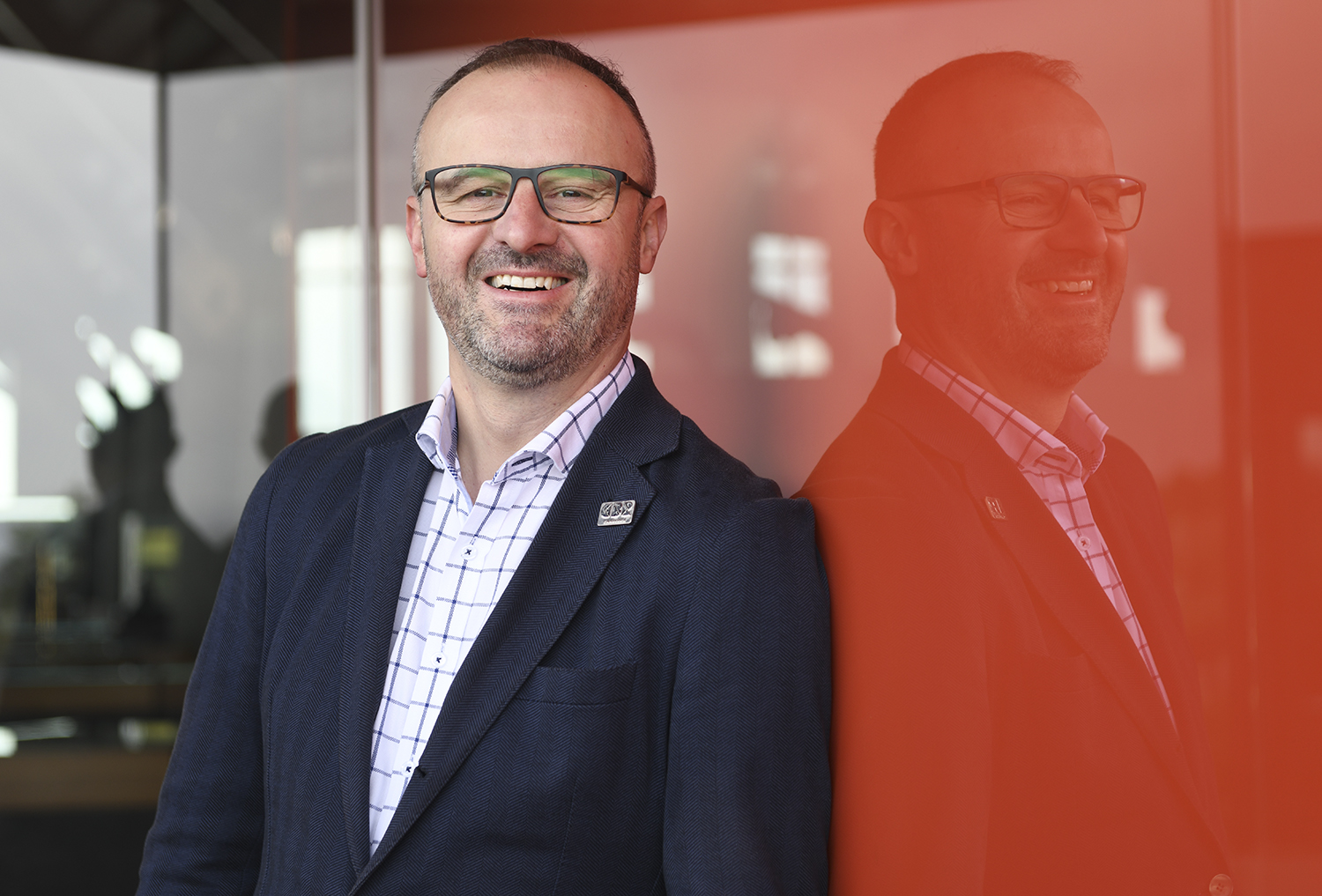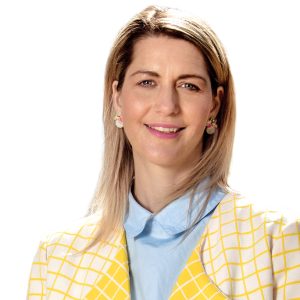
“If we aren’t supported in October that’s the end of an era, and I don’t intend to hang around like a miserable ghost.” Political reporter BELINDA STRAHORN gets a personal glimpse of Labor’s leader with a plan… win or lose.
THE ACT’s most powerful man won’t “hang around like a miserable ghost” if Labor isn’t re-elected come October 17 to govern the territory for a sixth consecutive term in office.?
While Labor leader Andrew Barr admits he hasn’t given much thought to post-election life, he does know that he won’t be leading the Labor Party in opposition, should their bid to win government fail.
“If we aren’t supported in October that’s the end of an era, and I don’t intend to hang around like a miserable ghost,” Barr said.
“Australian politics has had 10 years of former leaders undertaking less than constructive activities and contributions, so my role model in a post-political world would be Julia Gillard and find some productive things to do in areas that I’m passionate about.”
But that’s not front and centre of his mind right now. Pre-poll voting in the territory’s first pandemic-style election has opened ahead of the October 17 poll, and it’s from now that Barr faces the public’s verdict on how his government has managed over the past four years.?
It was a sunny day, when we met, which is good, for the man in the territory’s top job has a lot on his plate right now. He smiles as we “shake hands”, elbow style. There is an innate reassurance about Barr’s demeanor. He seems confident enough about the task ahead, but concedes it’s going to be one of the “strangest” elections he’s ever fought.?
In his half-decade role as chief minister, this year has been “tough”. From the fires that came close to the city’s southern suburbs to the pandemic and the rolling economic crisis, Barr has learnt more about bushfire smoke, hailstorms and the nature of infectious disease than any before him. Rejecting the notion that his is a tired government, Barr prefers to focus on his team’s experience and skill that is needed to steer the ship “with a steady pair of hands at the wheel” through the malaise that has cloaked 2020. His message to voters is that it wouldn’t be wise to change horses midstream.?
“Clearly the longer any government is in office there will always be a ‘we should give the other team a go,’ but my argument here is that now is certainly not the time to be making that change,” he said.
Part of Barr’s justification for seeking a further term is the fact that in his view the government has rejuvenated itself from within. The long history of governments formed in the ACT demonstrates why achieving a majority is rare and most administrations end up entering into a coalition with the Greens, a minor party or crossbench members to form government.
“Long-term governments certainly do need to renew in office and that’s certainly what has happened with new ministers and new members being elected,” Barr said.
“We have a team that is diverse in its backgrounds and ages, people like Gordon Ramsay who’s had significant careers outside of parliament, we have young people like Tara Cheyne and Michael Pettersson and there’s some middle-aged folk like myself, I am the longest serving having been? elected in 2006, the rest of my team are relatively new.”
Barr was 14-years-old when politics first grabbed him. He can pinpoint the exact moment – a winter’s day at Lyneham High School in 1988, when he knew a career in politics was on the cards.
“I got sent home for not wearing the school uniform,” he chuckled.
“Canberra can get pretty cold in winter and the jumper I was wearing over my school sloppy joe was a slightly different colour to one you were supposed to wear, the school was pretty strict on uniform.?
“So the injustice of not being able to wear a warm jumper on a cold day motivated a 14 year old.”
Did he protest?
“Yes, I did,” he replied.
“And that was the beginning of learnings in democracy at Lyneham High School in the 1980s.”?
Born in Lismore, Barr’s parents were still teenagers when he arrived on the scene. Still in high school at the time, his parents juggled studying at the? University of New England and raising their son. His brother was born six years later.
When Barr was four years old, the family moved to Canberra after his dad took a job with the Commonwealth Treasury. A close connection formed between the Barr family and former Treasury secretary Ken Henry and his family, with many camping holidays spent together.
Barr was 10 when Bob Hawke led the ALP to a comfortable victory over Malcolm Fraser’s Liberals in 1983, and Paul Keating, Barr’s political idol, became treasurer.?
“That was probably the first federal election I recall when Hawke won, and what that meant to my mum is something that stayed with me through all that time,” he said.
“There were three of us living in a two-bedroom granny flat off the back of someone else’s house in Fraser in 1983, we were not wealthy and I guess the election of the Hawke government was quite a big thing in our household.”?
Barr comes from a close-knit yet well-dispersed family, with his extended family relatives living in northern NSW – and all staunch supporters of the National Party.
“All of my parents’ brothers and sisters, who live in Sydney or Canberra, are the Labor outposts, and the Brisbane and northern NSW ones are a bit more on the conservative side.”
Although politics appears to have always been in his blood, Barr didn’t get involved with the Labor Party until he studied at the Australian National University.
“Paul Keating has just become prime minister, I had always had a passion for Keating, so when he became PM I decided it was time to join the Labor Party and that was 1992,” he said.?
A career working mostly as a political staffer followed, until 2006, when at 33, he became a member of the ACT Assembly, elected on a countback to replace former treasurer Ted Quinlan.
In one of his proudest achievements, Barr – the first openly-gay government leader – married his long-term partner Anthony Toms in 2019. But perhaps Barr’s greatest challenge will be convincing ACT voters that the government he leads is worthy of their trust for another term.
It’s an awful lot to ask, especially when Labor’s track record for financial management is questionable at best, having racked up disturbingly large budget deficits while in office.
Barr’s administration has also come in for well justified criticism for its management of the ACT’s overstrained hospital system with the longest waiting times of anywhere in Australia, coupled with cripplingly inadequate mental health services, an unacceptable rate of incarceration for Indigenous Australians, large urban infill, high taxes and a budget deficit, estimated to be the worst in ACT history.
The economic downturn which is a direct result of efforts at curbing the spread of COVID-19, may be somewhat of a blessing in disguise for Barr’s credentials as an economic manager. It will perhaps paper over some of the cracks in his government’s economic credibility by allowing his sixth-term administration to implement infrastructure programs to kickstart the economy in lockstep with other states and territories.
“The approach and the economic advice that is coming out of the Reserve Bank and national cabinet is we should be pursuing a growth agenda, not an austerity agenda,” Barr said.
“And that’s got bipartisan support amongst the state and territories and the federal Liberal government, so perhaps for the first time in a while there might be a degree of bipartisanship for the path of economic recovery and that is to grow your economy, prudently.”
Barr has identified that investment in major infrastructure projects will help lead the ACT economy out of the current recession, citing the 90-year old Manuka Pool, which was built during the Great Depression, as an example of what can be achieved coming out of the current economic downturn.
Infrastructure was always going to play a big part in Labor’s election campaign, specifically, stage two of light rail and the half-billion dollar redevelopment of the Canberra Hospital. The hospital redevelopment, a project long planned for and promised at the 2016 election for a 2022 finish, is now not going to start until 2021, with an expected completion date in 2024.
While Barr recognises that the second stage of the tram is unlikely to be such a polarising issue in the campaign this time, he argues that it is still an important piece of public infrastructure and his government is committed to delivering the next stage to Woden, at an estimated cost of $1.9 billion, but only when the economic circumstances are “right”.
“I want to reassure people that we are not just going to recklessly jump into [the light rail] procurement before it’s ready to go to the market, but we are committed to building it,” Barr said.
“We have gone through two elections of considerable [light rail] debate. We built stage one against arguably a very strong force of opposition, I think it’s less so this time around and people do want to see the network extended, and we will do so but in a prudent and sensible way.”
Looking ahead, if returned on October 17, Barr’s list of priorities for the first 100 days of a new term in government include maintaining the “strong” public health response to the pandemic, keeping Canberrans in jobs and putting together the Budget.
But the electoral arithmetic the Barr government is faced with means it will have to campaign exceptionally well to secure the support of a majority of Canberrans again.
The government’s fate hangs on the choices made by undecided voters in a couple of key electorates. While the magic number to form a majority government is 13, it is more than likely that, if returned, it will be as a minority government with the Greens.
With a lengthy and somewhat patchy economic record to defend, only time will tell if the voters’ patience has finally worn thin with Barr’s tenure as chief minister.
“In the end, I know that I’ll put my best foot forward and if people want a continuation with me as chief minister they’ll vote for that and if they don’t they don’t, and life moves on.”
Next week: Liberal leader Alistair Coe.
Who can be trusted?
In a world of spin and confusion, there’s never been a more important time to support independent journalism in Canberra.
If you trust our work online and want to enforce the power of independent voices, I invite you to make a small contribution.
Every dollar of support is invested back into our journalism to help keep citynews.com.au strong and free.
Thank you,
Ian Meikle, editor









Leave a Reply